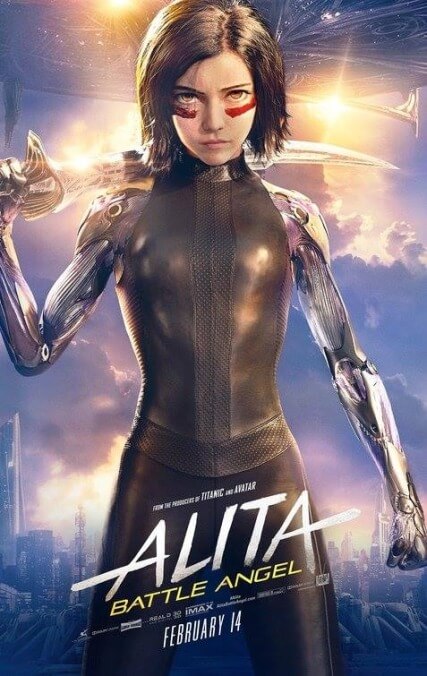Robert Rodriguez teams up with James Cameron to make his best movie in ages, Alita: Battle Angel

In the wake of dead-end sequels to Machete, Spy Kids, and Sin City, it might seem strange to describe director/writer/jack-of-all-trades Robert Rodriguez as ahead of his time. But during his peak productivity, Rodriguez was taking inspiration from comic books, conceiving homegrown franchises, and investing in digital-heavy productions before any of those things were especially commonplace. He even made 3D movies before the technique leaped into the 21st century with Avatar.
Rodriguez has made plenty of movies more expensive than his DIY debut El Mariachi, but despite his facility with genre material, he’s never made the jump to a giant-budget canvas until now; he was always too busy stretching his own canvases in his Austin backyard. For Alita: Battle Angel, his first feature in almost five years, Rodriguez finds himself in the orbit of Mr. Avatar himself, James Cameron. They’re realizing a project that was once kicked around as Cameron’s potential Titanic follow-up, an adaptation of a beloved manga about a warrior cyborg in the 26th century.
Like so many memory-challenged heroes before her, Alita (played in a motion-capture performance by Rosa Salazar) doesn’t remember her past as a fierce ass-kicker. Dr. Ido (Christoph Waltz) finds her unconscious in a junkyard, a seeming castoff from the unseen city of Zalem, which floats above the earthbound Iron City, a lower-class realm. Ido takes Alita home, gives her a refurbished body, and wakes her up. She’s immediately articulate and agile, but has a slightly childlike affect as she learns about the deliciousness of oranges and chocolate, and goggles alongside the audience at the busy city in front of her.
Alita’s patchy memories are a blessing, as they relieve her from the torrents of exposition that virtually every other character must spout. The script, by Cameron and Laeta Kalogridis, has the former’s trademark bluntness without his knack for memorably cornball banter; both her father figure, Ido, and her dashing love interest, Hugo (Keean Johnson), are more sensitive souls than Cameron’s usual military grunts, though perhaps prone to very male overexplanation. They spend a lot of time describing the intricacies of this world while still managing to leave some motivations and mechanics obscured, mostly to conceal secrets.
Suffice to say that this world has a lot of other cyborgs, that Alita is more powerful than she first realizes, and that Vector (Mahershala Ali), a shady human who runs the city’s professional motorball league (it’s sort of a cross between NASCAR and roller derby, played by homicidal cyborgs), takes an interest in our hero, especially once she registers as a Hunter Warrior (basically a futuristic bounty hunter). There are side villains, backstories, and secret overseers; the story has a shape as odd as some of its cyborg characters, who hulk or jut out beyond normal human size.
For a while, it’s hard to detect Rodriguez’s distilled-pulp style amid all the Cameron touches: robots, vast digital landscapes, even a brief foray into underwater artifact-retrieval. The early scenes between Ido and Alita are probably among the calmest, quietest passages Rodriguez has ever directed. But when Alita walks into a dive bar and essentially challenges a room full of colorfully weaponized Hunter Warrior robots to a massive brawl, suddenly the director is reinterpreting his old Desperado routine for a sci-fi epic, and it’s delightful. Alita’s fights, especially opposite the gigantic Grewishka (Jackie Earle Haley, somewhere in there), are inventively staged and fluidly shot by Rodriguez and Matrix cinematographer Bill Pope; her evasion of impossibly long, spiked chains in one scene looks downright balletic. The motorball scenes are similarly kinetic. It’s even forgivable, if somewhat inexplicable, that Rodriguez never indulges his talent for weapon-assembly montage in a setting where a lack of guns necessitates a lot of geeky customizations.
It might be clear by now that the science fiction of this Alita, despite touching upon artificial intelligence, class divisions, and a powerful metaphor for the abuses of the NFL, is not especially heady. The sight of torsos, limbs, and faces being torn off, stolen, or repurposed has a touch of body horror, but really, Rodriguez, Cameron, and Kalogridis are after more diverse effects. The movie is body horror, body action, and body romance, all Frankensteined together—and a lot of fun. The special effects that make all of this possible are cartoony, especially Alita’s expansive manga-homage eyes, and that’s not a bad thing. Like Avatar, the movie creates its own hybridized live action/animated reality.
In that zone of digital trickery, Salazar gives a real performance. If the screenplay doesn’t fully square Alita’s open-hearted outlook with her willingness to embrace the deadly warrior within, she makes the hardened fighter, swoony teenager, and restless daughter components of her personality feel organic. More organic, to be sure, than the unconvincing love story and a to-be-continued ending as clumsy as any number of YA adaptations or third-tier superhero adaptations. Like so many expensive fantasies, Alita: Battle Angel feels burdened by dreams of a franchise that may never materialize. But if a series does come to pass, Rodriguez should stick around. However briefly, big-budget filmmaking has synced up with his playground aesthetic.